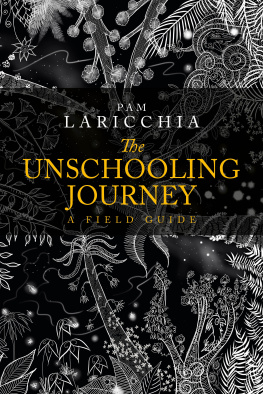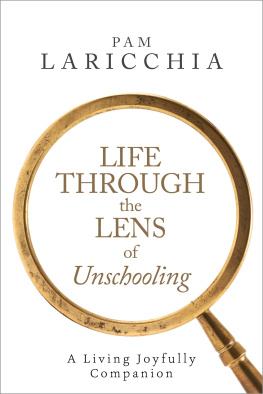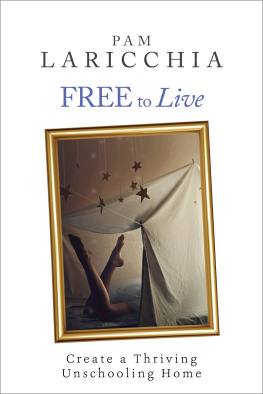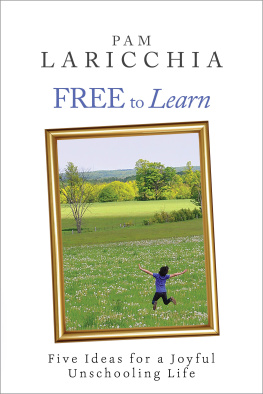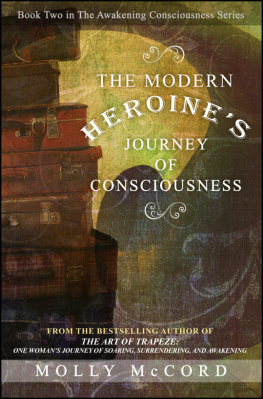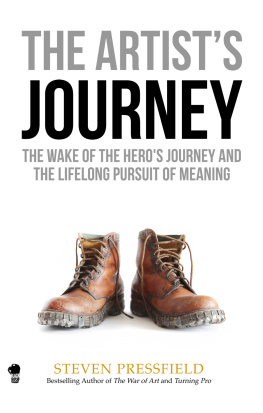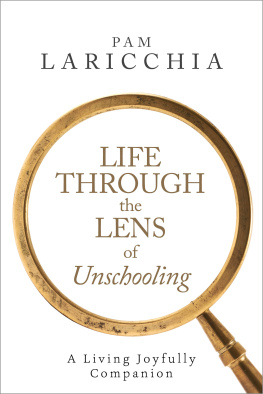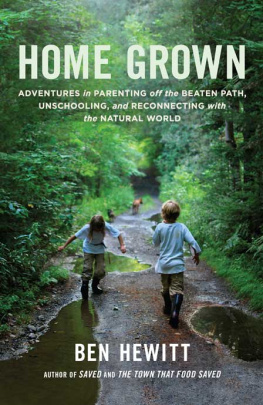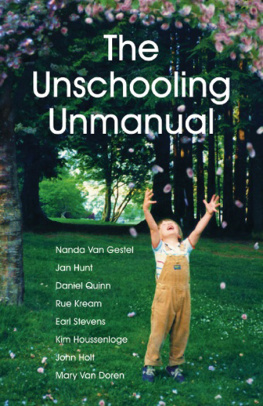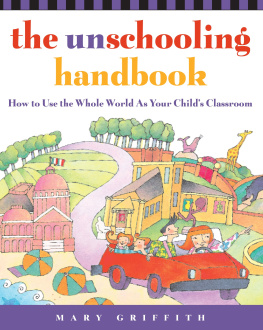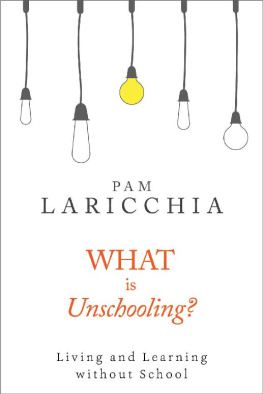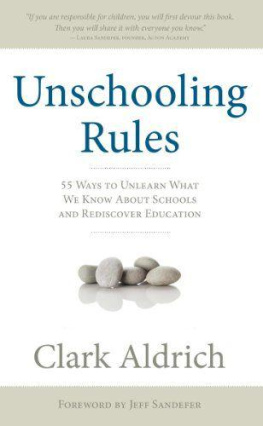Contents
The
UNSCHOOLING
JOURNEY
A FIELD GUIDE
Pam Laricchia
Illustrated by Hema Bharadwaj
The Unschooling Journey: A Field Guide
Copyright 2018 by Pam Laricchia
All rights reserved. No part of this publication may be reproduced,
stored in a retrieval system, or transmitted, in any form or by any
means, without the prior written permission of the publisher.
ISBN: 978-0-9940555-6-9
Published by Forever Curious Press
Illustrated by Hema Bharadwaj
Edited by Alexandra Peace
Cover and Interior Design by JD Smith
Joseph Campbells Heros Journey schema from The Hero with a Thousand Faces (New World Library) copyright 2008 by the Joseph Campbell Foundation ( jcf.org ), used with permission.
For my children, who continue to inspire me to keep an open mind.
INTRODUCTION
The heros journey.
I am thrilled youve chosen to join me in exploring the landmarks and features of the journey to unschooling. Our path may be fraught with perilous cliff-top trails and fast flowing waters, but we will also find safe harbours where we can rest and lush lowlands where well find nourishing foods to replenish our strength.
Yet for all its wildness and surprises, we are not the first to venture on this kind of epic journey into a new world. Human history is an intricate patchwork of heroic stories: European fairy tales of princesses and witches; ancient Greek myths featuring Zeus and Heracles; stories from religious traditions such as those of Mohammed, Jesus, and Guatama Buddha; the rituals and tales from Indigenous communities in the Americas, Australia, and Africa; and familiar, modern epics such as George Lucas Star Wars and JK Rowlings Harry Potter.
These seemingly disparate stories have grown from the same roots: what it means to be a human being living fully in the worldgrowing older and wiser. Joseph Campbell (19041987), an avid mythologist, spent years collecting and analyzing countless stories from around the world. The result was his influential book, The Hero with a Thousand Faces (published in 1949). He discovered an underlying pattern at the heart of heroic stories from across all cultures and eras, and he called it the monomyththe general sequence of events that outlines the heros journey.
The Unschooling Parent as Hero
How does this sequence of events relate to the journey to unschooling that we are about to undertake?
The monomyth of the hero describes an individual who somehow stumbles upon clues to a truth that lies outside of conventional belief, and begins a questphysical, spiritual, or bothto understand and eventually embody that truth as their new way of life.
Sound familiar? Unschooling, which I broadly define as learning without a curriculum, lies unquestionably beyond todays conventional wisdom about learning, parenting, and childhood. And through our journey to understand unschooling, we will learn and grow and change as we come to embrace this new lifestyle. Ours will be an inner, or spiritual, journey, but it will no less powerful for it. By the end, we will see our ordinary world in a new and extraordinary way.
I began unschooling my children back in 2002 and thats what happened to me. My family was firmly ensconced in the ordinary world of school. My children were in grades four, two, and junior kindergarten when I first discovered the world of unschooling and chose to answer the call. When my children first left school, I had no idea what was in store for meI just thought my kids were going to learn outside the classroom, and that was the end of the story.
I soon began participating in an online unschooling forum, then a couple of email lists, and then my learning began in earnest. I began questioning so many of my long-held assumptions about learning and parenting and children. No exaggeration, it was mind-blowing. And so began my inner journey.
I was active in online communitiesas fit around our unschooling livesand began a website to share information. In 2004, I wrote my first published magazine article about our experience and, in 2006, I began hosting a local unschooling conference and ran it for six years. I then decided to take that time and put it toward writing a book about what Id learned through ten years of unschooling. I published Free to Learn in 2012. And I was still learning: I wrote on my blog, I wrote another book, Free to Live , and, in 2014, I became a regular contributor to the Natural Parent Magazine .
Meanwhile, I was introduced to Joseph Campbells work and began to notice many subtleand some not so subtleconnections between his monomyth and my journey as an unschooling parent. My curiosity grew, and, in 2015, I wrote a series of essays on my blog about my unschooling adventures through the lens of the heros journey. Still, I couldnt shake my curiosity, and I dived into the idea of the heros journey even more deeply, culminating in this book. And Im still learning.
The quest that someone chooses to undertake that inspires them to question the conventional beliefs theyve been handed about what it means to be human can be almost anything: Bren Brown is on a quest to understand humanity through the lens of courage and vulnerability, Amanda Palmer through the lens of music and art, and even Joseph Campbell through the lens of stories.
Our quest is unschooling.
Two Fundamental Truths about Unschooling
Lets start at the beginning.
In our current culture, most people believe that learning of any value only happens in a classroom, with a curriculum, dispensed by teachers, and that children must be externally motivated to learn because it is hard work. Most of us grew up surrounded by these messages, and theyve become part of our belief system about children and learning.
But youre here, and ready to question these assumptions. Maybe your first, fleeting glimpse of this other worlda world beyond schools, teachers, and curriculacame when you stumbled across a clue to one of these two fundamental truths about learning that lie at the root of unschooling.
The first truth is that human beings are innately curious, natural learners. To paraphrase John Holt (1983), an educator turned unschooling advocate: Fish swim, birds fly; humans think and learn. Its what we do. Watch a young child in action; see their enthusiasm to try things, before we start to pepper them with No and Dont do that. When children are given the freedom to follow their intrinsic curiosity and explore the world around them with support from the adults in their lives, they learn. Full stop.
The second truth is that learning is everywhere. When were playing a game. When were at the store. When were having a conversation. When were watching TV. When were out for a walk. Human beings are always absorbing information and weaving it into their understanding of the world, making it tighter and stronger.
These truths about learning lie outside conventional beliefs, which are wrapped up in the ordinary world of schools and gold stars. Choosing to accept this quest to create a thriving unschooling learning environment for your children is to embark on your own hero's journey to appreciate, understand, and, in the end, integrate, these unschooling truthsthat learning is everywhere and that humans are wired to learninto your lives. They will lead you not only to a new educational paradigm but also to a new perspective on day-to-day living. The rewards on this journey are amazing!
The Stages of the Unschooling Journey
In this book, Im going to walk with you through the stages of the unschooling journey, or, the heros journey as seen through the lens of unschooling. Campbell structured his monomyth in seventeen stages, gathered into three distinct phases: departure, initiation, and return. As I dug deeper into the heros journey from my unschooling perspective, I tweaked the stages to more directly reflect the landmarks and features common to the unschooling journey. Tweaking this mythic structure to the particulars of a specific journey is expectedthats why the hero has a thousand faces, after all. This table compares the stages and terminology well be using in this book with Campbells original outline (Campbell 2008 2829).

